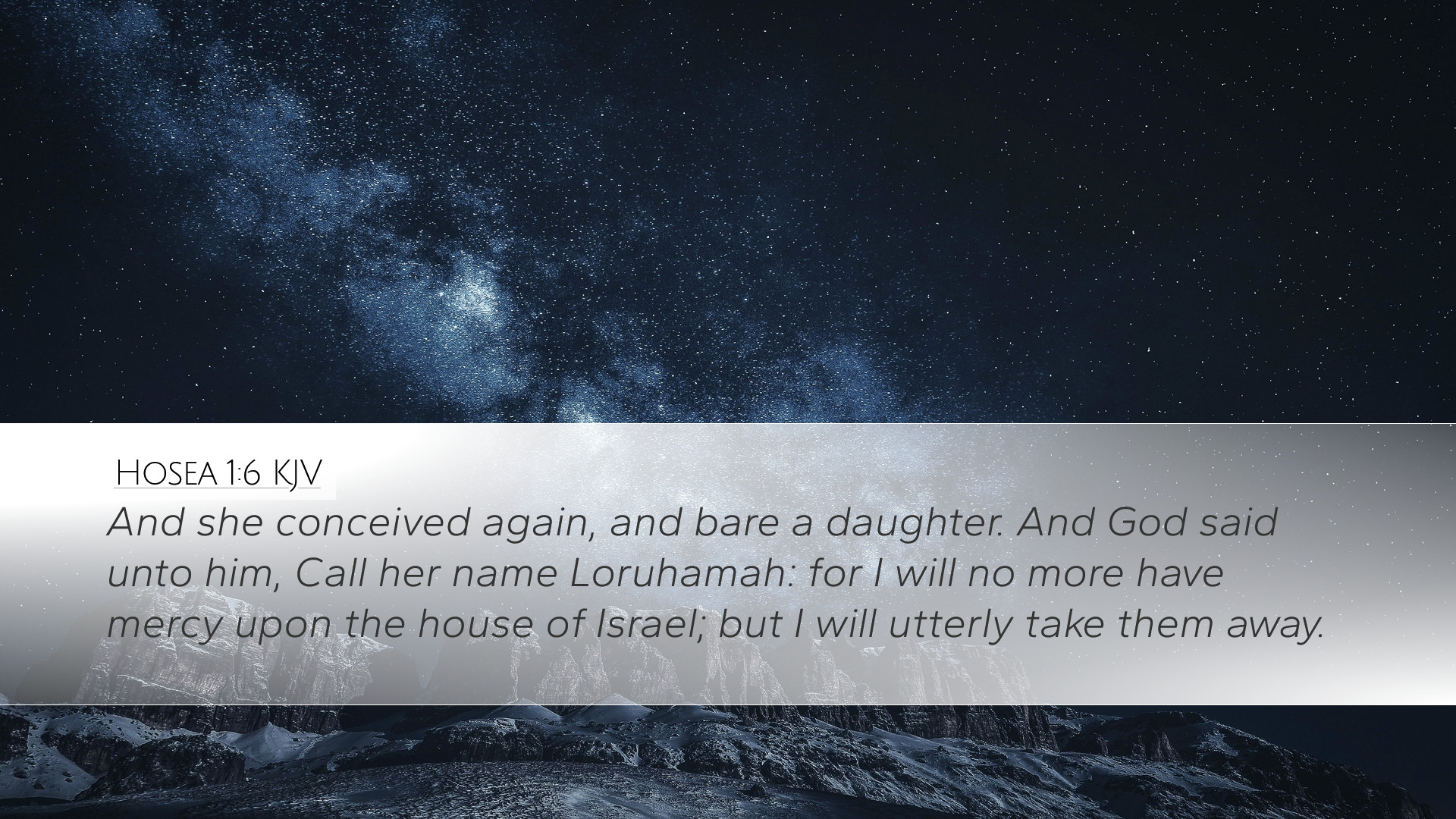Old Testament
Genesis Exodus Leviticus Numbers Deuteronomy Joshua Judges Ruth 1 Samuel 2 Samuel 1 Kings 2 Kings 1 Chronicles 2 Chronicles Ezra Nehemiah Esther Job Psalms Proverbs Ecclesiastes Song of Solomon Isaiah Jeremiah Lamentations Ezekiel Daniel Hosea Joel Amos Obadiah Jonah Micah Nahum Habakkuk Zephaniah Haggai Zechariah MalachiHosea 1:6
Hosea 1:6 KJV
And she conceived again, and bare a daughter. And God said unto him, Call her name Loruhamah: for I will no more have mercy upon the house of Israel; but I will utterly take them away.
Hosea 1:6 Bible Commentary
Commentary on Hosea 1:6
Hosea 1:6 states, "And she conceived again, and bare a daughter. And God said unto him, Call her name Loruhamah: for I will no more have mercy upon the house of Israel; but I will utterly take them away."
This verse serves as a pivotal moment in the prophetic narrative of Hosea, encapsulating themes of judgment, mercy, and divine revelation. The complexity of Israel's relationship with God is reflected in the names of Hosea's children, which carry significant prophetic meanings. In this verse, the birth of a daughter named "Loruhamah," translating to "not having mercy," reveals God’s impending judgment upon the nation. This commentary explores the multilayered implications of this name and the context in which it is given.
Overview of the Context
The book of Hosea stands out in the prophetic literature of the Old Testament. Hosea’s personal life becomes a metaphor for the spiritual state of Israel. His marriage to Gomer, a woman described as unfaithful, parallels Israel’s covenant unfaithfulness to God. Each child born to this union bears a name that encapsulates God’s relationship with His people.
Significance of the Name "Loruhamah"
The name "Loruhamah" alone is a powerful indication of God’s stance toward Israel at this time. Where the previous child, Jezreel, hinted at impending judgment against the house of Jehu (Hosea 1:4), Loruhamah signifies a complete withdrawal of divine mercy.
- Divine Displeasure: The very name "Loruhamah" means "not pitied" or "not having mercy." This communicates God's displeasure with Israel's actions.
- Judgment Foretold: By naming the daughter Loruhamah, God foreshadows the consequences of Israel’s persistent disobedience. It serves as a declaration that God will not extend His kindness indefinitely.
- Theological Implications: This name emphasizes a fundamental aspect of God's nature; He is both merciful and just. When His mercy is rejected, divine justice must prevail, leading to judgment.
Combination of Insights from Commentaries
Matthew Henry's Commentary
Matthew Henry elaborates on how the naming of Loruhamah symbolizes a dire warning. He emphasizes that despite God's previous mercies, the people of Israel have acted in such a way that they provoked Him to respond in judgment. Henry highlights that God's withholding of mercy does not negate His essence but reveals His righteousness. The people must come to understand the gravity of their sins.
Albert Barnes' Notes on the Whole Bible
Albert Barnes focuses on the context of the name and the consequences that follow. He explains that God's declaration here indicates the cessation of His merciful acts towards Israel. Barnes provides insight into the broader narrative, urging readers to see how God’s engagements with His people require fidelity and faithfulness. He notes that Loruhamah serves as a stark reminder of the results of persistent disobedience.
Adam Clarke's Commentary
Adam Clarke brings attention to the emotional and relational aspects of Hosea’s prophetic message. Clarke points out that naming the daughter "Loruhamah" illustrates the depth of Israel's rebellion and the heartbreak of God. He suggests that the name not only expresses God's judgment but also reflects the tragic results of estrangement from His divine love. Clarke encourages introspection about the nature of the covenant and the dire consequences of neglecting it.
The Implications for Today
For pastors, theologians, and scholars today, Hosea 1:6 invites a thoughtful examination of God's current dealings with humanity. The notion that divine mercy can be withdrawn acts as a sobering reminder of the necessity for repentance and faithfulness to God. The name "Loruhamah" embodies the painful condition of separation that results from sin, echoing the call for the church to return to a place of fervent devotion to God.
- Repentance: The narrative encourages communities of faith to reflect on their distance from God and challenges them to seek a restoration of His mercy.
- Greatness of God's Mercy: Understanding the gravity of "not having mercy" deepens appreciation for the grace extended through Jesus Christ, who bridges the gap created by sin.
- Covenant Faithfulness: The text presses readers to evaluate their own commitments and fidelity to God, urging a conscientious lifestyle aligned with His will.
Conclusion
Hosea 1:6 is not merely a historical account but a profound theological statement that carries relevance across generations. The stark message encapsulated in the name Loruhamah serves as a warning, a call to reflection, and ultimately an invitation to embrace the fullness of God's mercy through true repentance. As we delve deeper into the prophetic literature, may we engage with the truth that God’s character remains consistent: He desires a relationship with His creation that reflects faithfulness and love.


